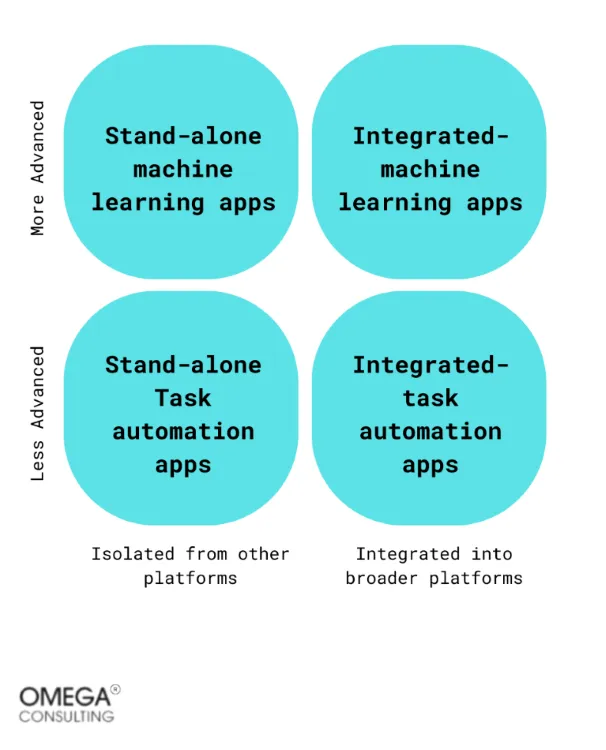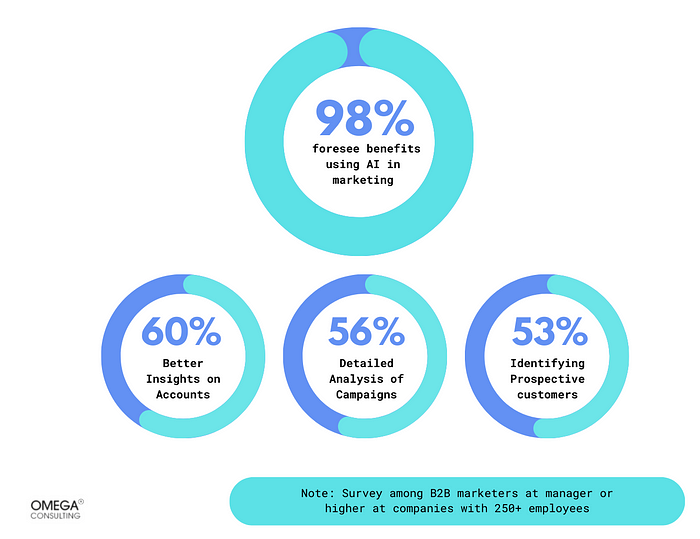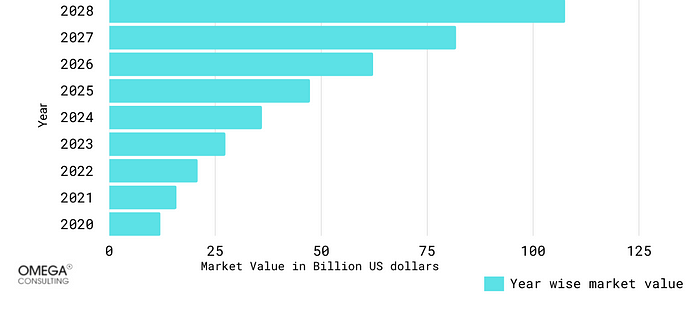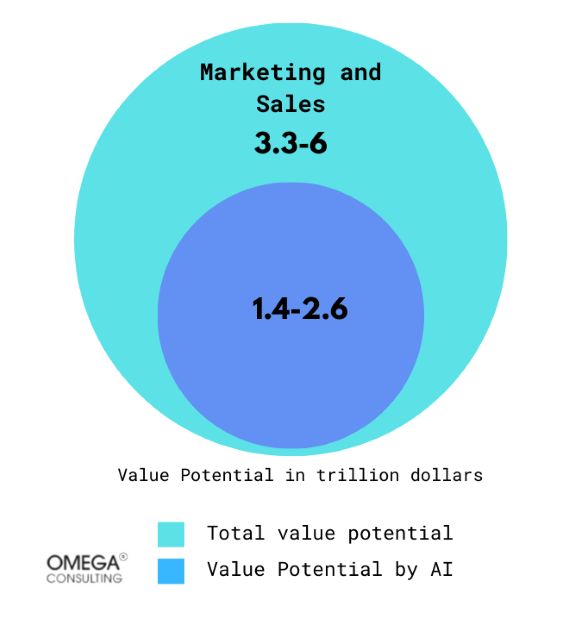- Industries
Industries
- Functions
Functions
- Insights
Insights
- Careers
Careers
- About Us
- Marketing & Advertising
- By Omega Team

Introduction
Quantum marketing is the emerging field of marketing that is powered by various technologies. One such technology is AI which is revolutionizing many businesses’ systems and processes, but how can it benefit marketing? Marketing is a less-understood and-explored domain with tremendous potential for AI application. Personalized marketing experiences can increase revenues by up to 80%. AI is now an indispensable component of efficient marketing operations.About AI Marketing
Marketing tools powered by artificial intelligence can facilitate the execution of crucial, data-driven marketing decisions. By swiftly collecting and analyzing data, artificial intelligence can make several tactical decisions that would require humans significantly more time and effort. Marketing tools with artificial intelligence may perform tasks such as data analysis, economic and consumer trend analysis, media buying, content creation, content personalization, etc.Core elements of AI marketing
Marketing solutions that utilize artificial intelligence can bridge the divide between data science and execution. The once-impossible task of filtering through and analyzing vast amounts of data is now feasible, easy, and efficient. Adopting AI marketing is as essential as today due to a few key factors, including big data, machine learning, and powerful solutions.
Big Data
Big data is a relatively simple concept. It refers to the capacity of a marketer to aggregate and segment vast data sets with minimal manual effort. Marketing teams can use this information to make sure that the right message at the right time is communicated to the right person.
Machine Learning
Machine learning is helpful for marketers attempting to make sense of the massive data repository. They can aid in identifying trends or common occurrences and accurately foresee shared insights, responses, and reactions, enabling marketers to comprehend the underlying cause and likelihood of specific actions occurring again.
Powerful Solutions
Marketing solutions powered by artificial intelligence share the same perspective as humans about the world. The platforms can rapidly recognize insightful concepts and themes across vast data sets. AI solutions also interpret sentiment and communication like humans, allowing these platforms to comprehend free-form content such as social media posts, emails, and natural language.
How Does AI Marketing Work?
Artificial intelligence marketing utilizes consumer data from online and offline sources and concepts such as machine learning to predict website and app user behavior. Then, businesses can target particular consumers with personalized content on the optimal channel at the optimal time.AI’s increasing importance in marketing campaigns indicates AI’s rapid development. IDC predicts that by 2023, expenditure on AI systems will reach $97.9 billion. IDC also predicts that the retail and financial sectors will lead this expansion, but it will also extend to many other industries.
How to Design an AI marketing strategy
Two dimensions can be used to classify marketing AI: intelligence level and whether it is standalone or Integrated. Some technologies, such as chatbots, can fall into any category; their classification is determined by how they are implemented within a particular application.Let’s first examine the two categories of intelligence.
Task automationThese applications carry out structured duties that demand low intelligence. They are designed to follow the rules or execute a predetermined sequence of operations in response to a given input. Still, they cannot handle complex problems such as nuanced consumer requests. They can assist customers during fundamental interactions by guiding them through a predefined decision tree. Still, they cannot discern customers’ intent, provide customized responses, or learn from interactions over time.
Machine learning
These algorithms are taught to make relatively complex predictions and conclusions using vast data. These models can identify images, interpret text, segment customers, and also predict how customers will respond to various initiatives, such as promotions. Machine learning has already driven programmatic purchasing in the areas of online advertising, e-commerce, and customer relationship management (CRM) systems.
Comparison between standalone AI to integrated AI.
Stand-alone applicationsThese are best understood as precisely defined or isolated artificial intelligence programs. They are distinct from the primary channels customers use to learn about, purchase, or receive support for using a company’s offerings.
Integrated applications
Integrated applications are embedded within existing systems. These AI applications are frequently less visible to consumers, marketers, and salespeople than standalone ones. For instance, platforms that manage the entire process of purchasing and positioning ads incorporate machine learning algorithms that make split-second decisions about which digital ads to be offered to the users.
Exhibit 1
The Four Kinds of Marketing AIThe four quadrants of this framework result from the combination of the two categories of intelligence and the two types of structure.

Use Of AI In Marketing
Marketing and business have been significantly impacted by AI. AI is everywhere in our world. Google, chatbots, self-driving cars, and digital assistants are examples. AI Marketing allows marketers to better understand their target consumers thanks to big data and analytic technologies. CRM solutions like Salesforce assist marketers in streamlining their work by giving ways to access whatever they need to better their marketing efforts.Here are some AI Marketing strategies for businesses:
Improve customer experience
Customer experience is the customer’s view of your brand, which is why digital transformation has increased in recent years. Look at how logos, websites, applications, and marketing efforts have transformed in the previous decade. AI was crucial to this.
Automated customer segmentation
Effective marketing requires accurate consumer segmentation. You may generate more effective campaigns by segmenting your target audience.
Increase product and marketing innovation
Artificial intelligence saves time and helps you create fresh concepts for this new automated industry.
Quicker and better-quality interactions
In today’s hyper-connected world, consumers value every second. Therefore firms must respond quickly, or they’ll go elsewhere. “Chatbots that immediately respond to common customer service requests or take orders are becoming more popular, and many companies are replacing the “add to cart” button with a “buy it now” option.
Exhibit 2
Anticipated Benefits of Using Artificial Intelligence in MarketingThe following survey shows that 98% of B2B marketers foresee the benefits of using AI for Marketing, out of which 60% of marketers find it beneficial for getting better insights on accounts, 50% of them find it beneficial for obtaining detailed analysis of campaigns and 53% for identifying prospective customers.

Exhibit 3
The market value of artificial intelligence (AI) in marketingMarketing AI was worth 15.84 billion U.S. dollars in 2021. The source predicted a value of over 107.5 billion by 2028.

Exhibit 4
Total Value Potential in Marketing and SalesAI has the potential to generate up to $2.6T additional value in the Marketing and Sales segment.

Businesses Utilizing AI in Marketing
- Publica provides an ad tech platform for connected TVs, such as Smart TVs, which can transmit video from the internet. Publica’s Elea AI utilizes machine learning algorithms to forecast which advertiser’s content is about to run an ad program, enabling ad publishers to make strategic decisions regarding controls such as ad frequency limits, advertiser block lists, and competitive separation Google’s responsive search ads allow up to 15 headlines and four description lines. With Google Ads, entrepreneurs can jumpstart their businesses by customizing their advertisements based on geographic range, budgetary requirements, and other variables. This application is also compatible with Google Cloud to give marketers more in-depth audience insights.
- Businesses rely on EliseAI’s conversational AI platform to respond swiftly and automatically to consumer inquiries. The technology, which operates across text, chat, and email, does more than simply respond to questions. In addition, it executes specified duties based on customer feedback, all with a “human touch.”
- AI from IBM allows businesses to fine-tune their marketing strategies. The AI assistant IBM Watson identifies prospective audiences, selects pertinent, creative content, and initiates one-on-one conversations with target audiences. As a result, businesses have discovered more efficient methods to spend their marketing budgets while tailoring ad campaigns to the interests of their target audiences.
- Salesforce’s Marketing Cloud allows teams to create personalized marketing campaigns. This platform captures customer data and accumulates insights when customers interact with a campaign. Teams then gain a comprehensive view of their audiences and can make alterations on the move, resulting in AI marketing content that adapts to the preferences of potential customers.
Ada has developed an AI-based customer service automation platform to strengthen relationships between brands and consumers. Ada’s technology enables businesses to scale customer support, save time for sales agents, instigate timely interactions, and engage with customers across digital and social channels. Now, companies can provide service around the clock, streamline repetitive duties, and improve their outbound messaging strategies.
Advantages of using AI in Marketing
Utilizing AI in marketing enables marketers to collect data from multiple sources and gain actionable customer insights. The following are some specific AI benefits for marketing teams:Enhanced effectiveness
Marketers have more time to create content, strengthen brand messaging, and develop campaigns when processes are automated. Thus, teams become more efficient overall, as administrative and manual tasks consume less time.
Error correction
With AI technology integration, there are fewer opportunities for error. AI is also equipped with security features that prevent data from being intercepted.
Greater personalization
Netflix’s engagement is high in number because of the accuracy of its recommendation engine; personalization is crucial in this context and marketing in general. Only AI can swiftly collect and analyze data to generate personalized content and recommendations for users navigating a website or app.
Enhanced decision-making
Because AI tools continuously capture data, marketing teams do not have to wait until a campaign concludes to make decisions; they can act on real-time data at the moment and then continue analyzing data to determine the impact of their choices.
Increased Return on Investment
With AI marketing, teams can realize a higher ROI for every interaction with a consumer. AI assists marketers in creating customized content, optimizing the cadence of communications, and measuring their interactions’ effectiveness.
Disadvantages of using AI in marketing
Requires rich data setsThe only practical limitation of artificial intelligence is the availability of data. With the existence of a direct correlation between the quality of data sets and the performance of an artificial intelligence application, data becomes very vital to an AI system.
Uncertainty in prediction and analysis
Both reliable sentiment analysis (determining whether a sentence is joyful, melancholy, or sarcastic) and faithful sentence parsing are challenging for artificial intelligence.
Extremely difficult to replicate human behavior
Humans exhibit a unique capacity to experience highly complex emotions and translate them into emotional connections. The precision with which technologists can replicate human ‘intelligence’ and decision-making will also contribute to the limitations of artificial intelligence.
Complicated and Disconnected Marketing Stack
The disparate, disconnected systems that make up the marketing stack can be a significant hurdle to the first of these.
Unrealistic Expectations of AI’s Potential
AI has made great strides in coping with unstructured data regarding real-world use cases, and you can do many exciting things with it. It is mainly effective, but many of its capabilities for real-world implementations are still relatively basic.
Conclusion
Once the AI tools are in place, businesses should establish a process for perpetually training and refining the AI models to ensure their long-term effectiveness. In addition, the ethical and privacy implications of utilizing AI and ensuring that all AI initiatives are consistent with company values and industry regulations are also essential. Owners of businesses should familiarize themselves with applicable laws, undertake privacy impact assessments, ensure that AI solutions are transparent, and collaborate with AI ethics and privacy experts. When assisting companies with aligning their marketing and sales efforts, consulting firms, for instance, it should begin by auditing the company’s current AI utilization. Once a best practice has been determined, firms should discover and recruit experts to ensure optimal performance in both departments. By adhering to these best practices and ensuring that AI is implemented in a manner tailored to a company’s specific requirements, AI has created numerous opportunities for optimization and operational improvement. One must discover the optimal balance between AI and humans to serve the consumers better and streamline the employees’ workflow.Subscribe
Select topics and stay current with our latest insights
- Functions